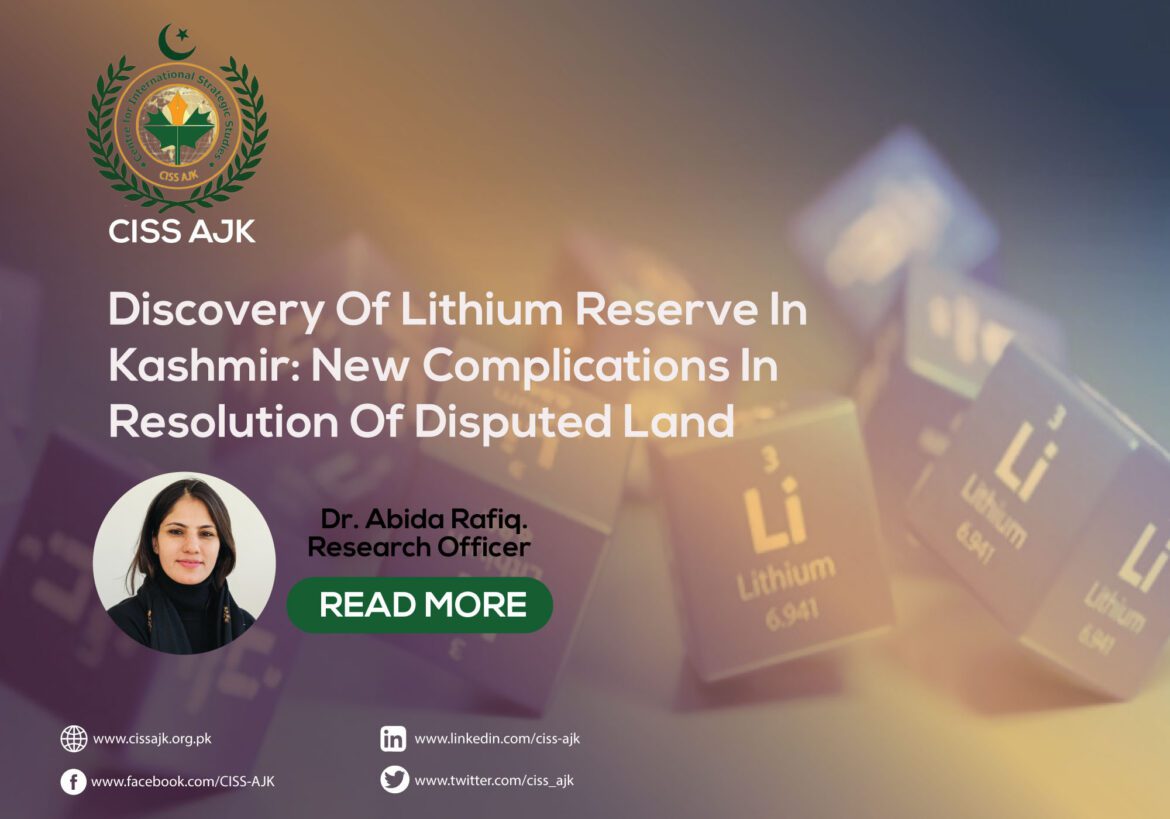729
One of the greatest lithium resources in the world, the 5.9 million tonne lithium reserve was found in the Reasi district by the Geological Survey of India (GSI).
As lithium is used for the creation of rechargeable batteries, which are used in a variety of electronic products, including as smartphones, laptops, and electric cars, lithium is regarded as a crucial component. The recent discovery of this sizable lithium deposit in India may be able to assist the nation in supplying its expanding domestic metal demand, which has been driven up recently by the popularity of electronic gadgets and electric vehicles. The finding of this significant lithium deposit in India may help the nation become a significant player in the global lithium market in addition to satisfying domestic demand. Currently, India is import-dependent for lithium
This has increased the importance of Kashmir for India which can be understood as statement; that lower Himalayas in Jammu and Kashmir need to be properly explored, according to Jugal Kishore Sharma, a senior Democratic Azad Party (DAP) politician and former minister. The growing concern would be India will speed up her approach towards Kashmir by increasing military troops , more will intensify its plans to change the demographic composition of Jammu and Kashmir and convert the Muslim majority into a minority and also will swiftly work on merging Kashmir in India as own state. And will create lobby to zero flex over issue on international forums. This can also can be understood that the Geology & Mining Department of Jammu and Kashmir is now putting two significant mineral blocks of limestone up for e-auction in the border districts of Rajouri and Poonch, close to Reasi. The process of determining the availability of lithium and e-auctioning the output in a time-bound way, according to officials, has already begun.
Amit Sharma told the Jammu-based Daily Excelsior that the GSI and dedicated teams will work together to take all required steps and work around the clock to guarantee that the main mineral blocks’ e-auctioning occurred in a timely manner. Sharma also asserted that “Lithium blocks which are a rare thing and a much demanded global mineral for electric batteries which is the future, shall be explored and e-auctioned so that J&K figures on the global map so far as availability of lithium reserves in the world are concerned,”
Additionally, the Jammu and Kashmir Reorganisation Act, 2019, which divided the state into the two union territories of J&K and Ladakh, was passed by the Indian government in an effort to reorganize J&K. A third order of reorganization that was put into effect on October 27, 2020, removed the phrase “permanent resident of the state” and allowed any Indian citizen to purchase land in J&K. Politicians from Kashmir have denounced this, saying that it “puts the J&K land up for sale.”
Other initiatives are also in progress to alter Jammu and Kashmir’s demographics, particularly in the Kashmir Valley, where Muslims make up more than 97% of the population. These include composite townships for Kashmiri Hindus and separate communities for retired Indian Army personnel who are not from Kashmir. In Indian-occupied Kashmir, India plans to settle non-Kashmiris under the guise of these Israeli-style settlements.
An outsider may obtain land in occupied Kashmir on lease for a duration of 40 years under the industrial policy issued for the period of 2016–2026. Then, it can be prolonged for up to 90 years. Even the Indian Supreme Court legalized seizure of the Kashmiris’ properties and their transfer to non-state subjects, all of whom are expected to be non-Muslims. The Indian government is accused of wanting to change J&K’s demographics so that Kashmiris become a minority. 68.3% of people in J&K were Muslims as of the 2011 Census, according to the Census Commissioner of India.
This will furthermore decrease world attention from Kashmir conflict to Kashmir-opportunities and will affect Kashmir cause.
Research Officer CISS AJK



